Configure Remote Access VPN with RADIUS Authentication on ISE and Group-Policy Mapping
Available Languages
Download Options
Bias-Free Language
The documentation set for this product strives to use bias-free language. For the purposes of this documentation set, bias-free is defined as language that does not imply discrimination based on age, disability, gender, racial identity, ethnic identity, sexual orientation, socioeconomic status, and intersectionality. Exceptions may be present in the documentation due to language that is hardcoded in the user interfaces of the product software, language used based on RFP documentation, or language that is used by a referenced third-party product. Learn more about how Cisco is using Inclusive Language.
Introduction
This document describes configuring Remote Access VPN for group-policy mapping with Cisco Identity Services Engine (ISE).
Prerequisites
Requirements
Cisco recommends that you have knowledge of these topics:
- Cisco Secure Client (AnyConnect)
- Cisco ISE
- Remote Access VPN on Cisco Adaptive Security Appliance (ASA)
Components used
The content of this document is based on these software and hardware versions.
- ASA 5506 with Software Version 9.8.1
- AnyConnect Version 4.8
- ISE Version 2.4.
The information in this document was created from the devices in a specific lab environment. All of the devices used in this document started with a cleared (default) configuration. If your network is live, ensure that you understand the potential impact of any command.
Configure
In this configuration example, remote users connecting to the ASA via VPN using Cisco Secure Client (AnyConnect) are not allowed to select a connection profile (tunnel-group) from the drop-down menu, as Cisco ISE maps them to a specific Group-Policy based on the configured policies.
With this setup, you can assign a group-policy to each AnyConnect user through ISE. Since the users do not have the option to select the tunnel group, they are initially connected to the DefaultWEBVPNGroup tunnel-group and the DfltGrpPolicy group-policy. After authentication, if the RADIUS Class attribute (Group-policy) is sent by ISE within the authentication response, the user is assigned to the corresponding group-policy, thereby receiving the appropriate permissions. If ISE does not return any Class attribute or returns a group-policy label that is not configured on the ASA, the user remains assigned to the DfltGrpPolicy. To prevent users without an assigned group-policy from connecting through the VPN, you can configure the vpn-simultaneous-logins 0 command under the DfltGrpPolicy group-policy.
Configuration
ASA
AAA-Server
aaa-server ISE_AAA protocol radius
aaa-server ISE_AAA (Outside) host 10.31.124.82
key cisco123
Remote Access VPN Configuration
webvpn
enable outside
anyconnect image disk0:/anyconnect-win-4.7.01076-webdeploy-k9.pkg 1
anyconnect enable
tunnel-group DefaultWEBVPNGroup general-attributes
address-pool Remote_users
authentication-server-group ISE_AAA
group-policy DfltGrpPolicy attributes
banner value ###YOU DON'T HAVE AUTHORIZATION TO ACCESS ANY INTERNAL RESOURCES###
vpn-simultaneous-logins 0
vpn-tunnel-protocol ssl-client
group-policy RADIUS-USERS internal
group-policy RADIUS-USERS attributes
banner value YOU ARE CONNECTED TO ### RADIUS USER AUTHENTICATION###
vpn-simultaneous-logins 3
vpn-tunnel-protocol ssl-client
split-tunnel-network-list value SPLIT_ACL
group-policy RADIUS-ADMIN internal
group-policy RADIUS-ADMIN attributes
banner value YOU ARE CONNECTED TO ###RADIUS ADMIN AUTHENTICATION ###
vpn-simultaneous-logins 3
vpn-tunnel-protocol ssl-client
split-tunnel-network-list none
ISE
Step1. Register the ASA as a valid network device on ISE and configure the shared secret key for RADIUS. For this, navigate to Administration>Network Resources>Network Devices.
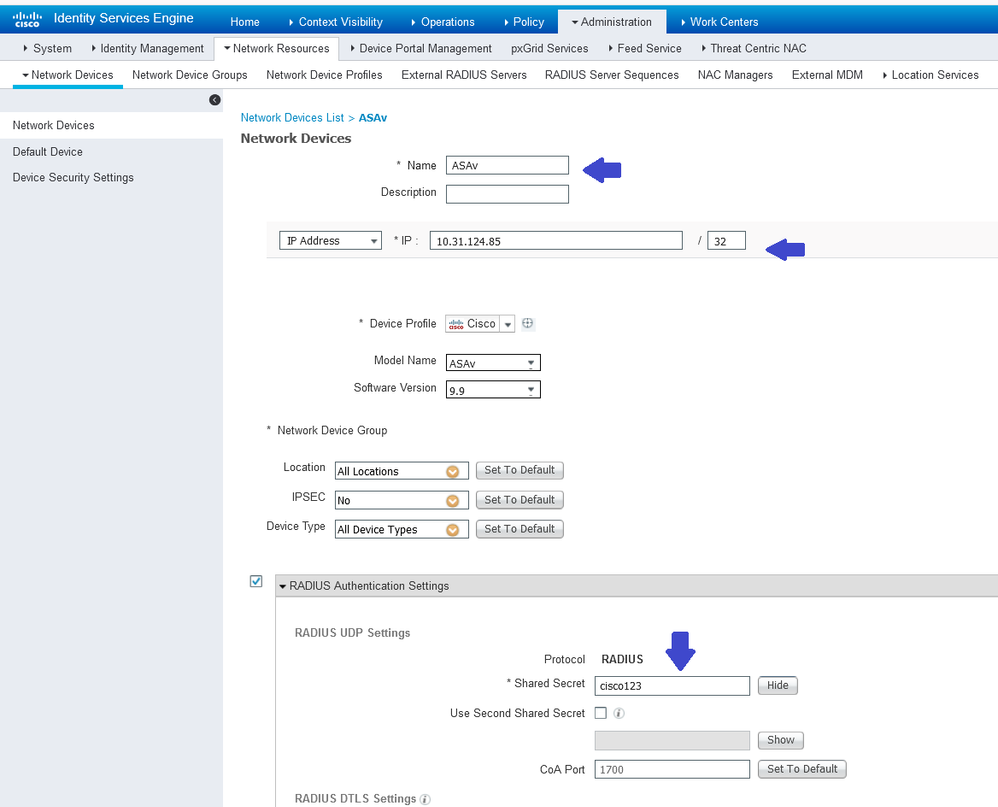
Step 2. Create identity groups.
Define identity groups to associate users with similar characteristics and who share similar permissions. These are used in the next steps. Navigate to Administration>Groups>User Identity Groups.
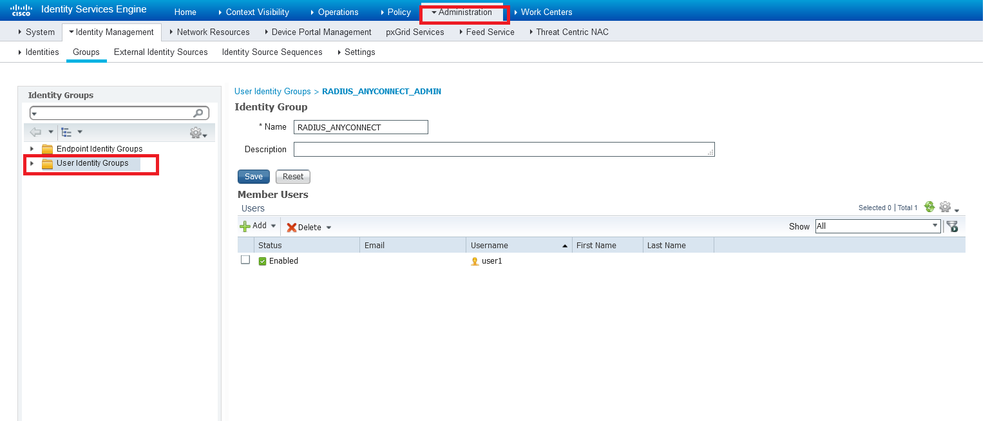
Step 3. Associate users to identity groups.
Associate users to the right identity group. Navigate to Administration>Identities>Users.

Step 4. Create Policy Set.
Define a new policy set and define the conditions that match the policy. In this example, all device types are allowed under the conditions. For this, navigate to Policy>Policy sets.

Step 5. Create an Authorization Policy.
Define a new Authorization Policy with the required conditions to match the policy. Ensure to include the identity groups created in step 2 as a condition.
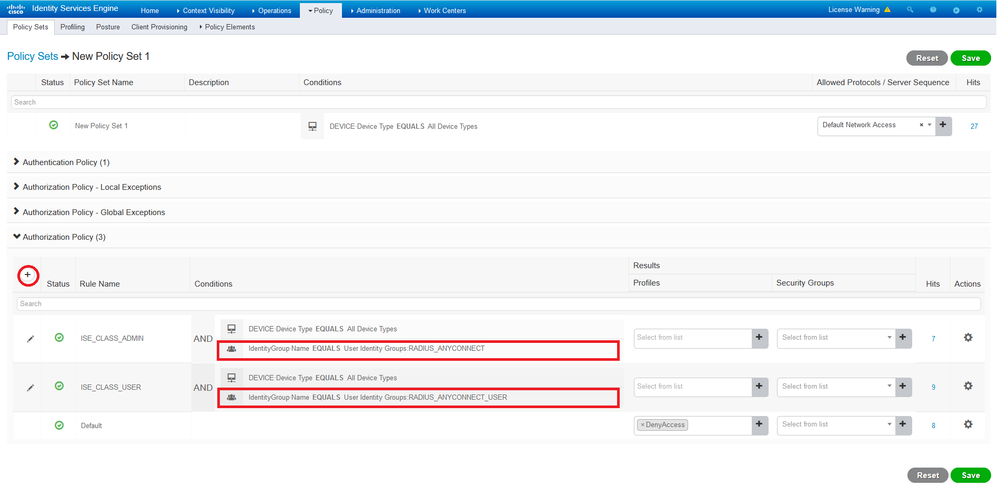
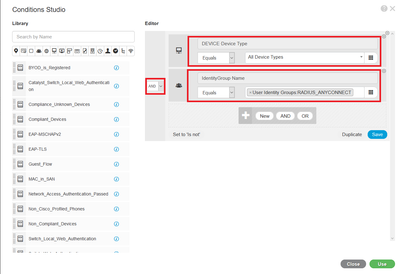
Step 6. Create an Authorization Profile.
The authorization profile includes the actions that are taken when the authorization policy is matched. Create a new Authorization Profile that includes the next attributes:
- RADIUS Class = <Group-policy-ASA>
- Access Type: ACCESS_ACCEPT.
Note: You must edit the configuration displayed in the previous images to match the name of the group-policies you defined in your ASA configuration.

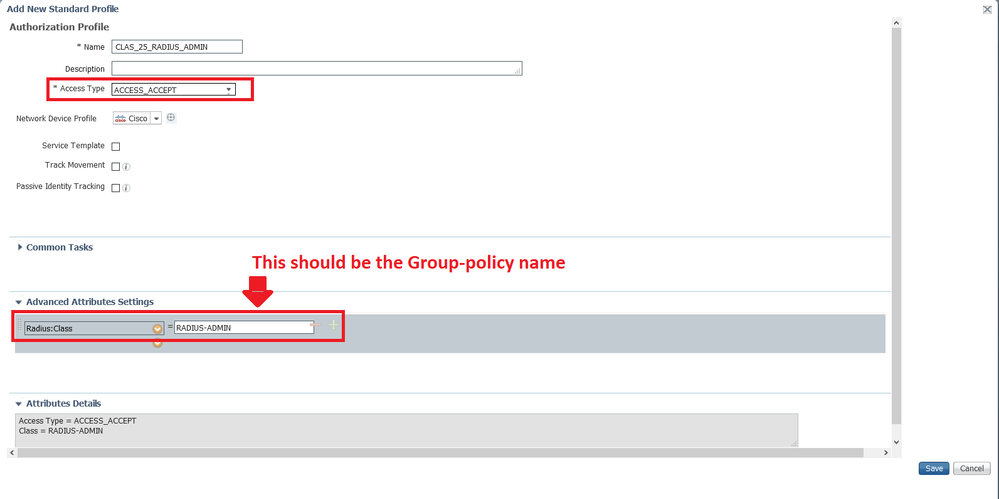
Step 7. Review the Authorization Profile configuration.
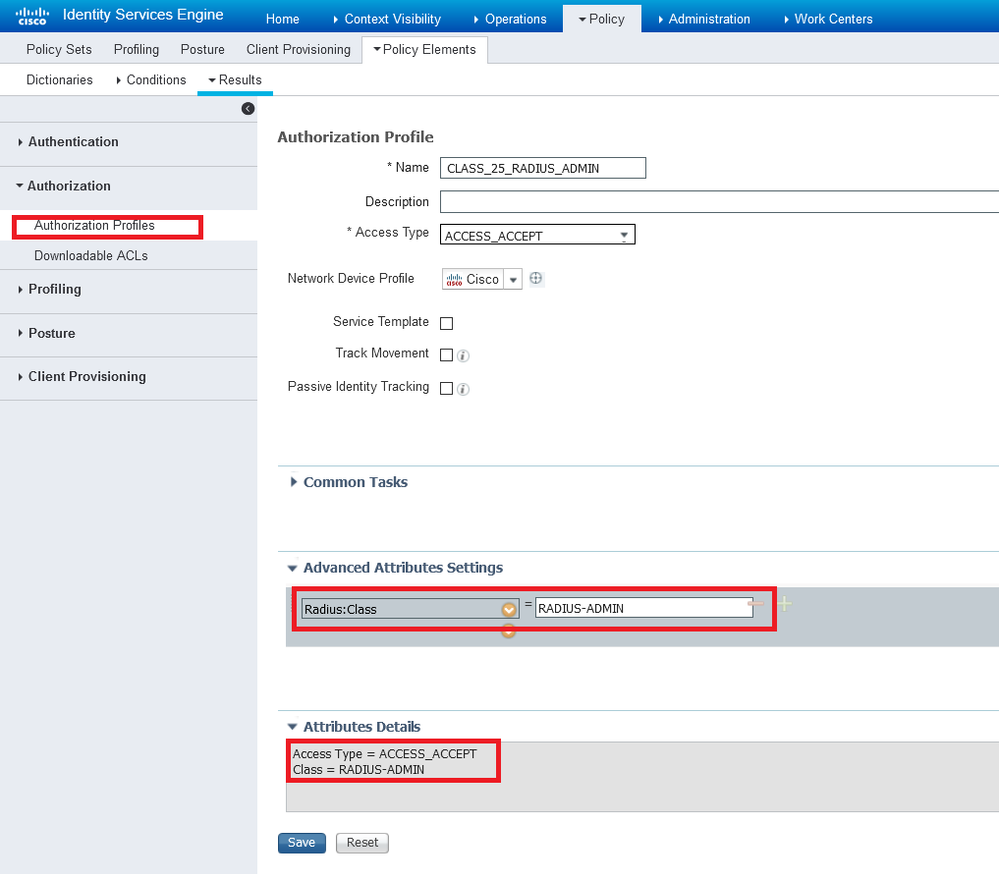
Note: In the same policy set, you can have n authorization policies, to map each identity group to a specific group-policy defined on the ASA..
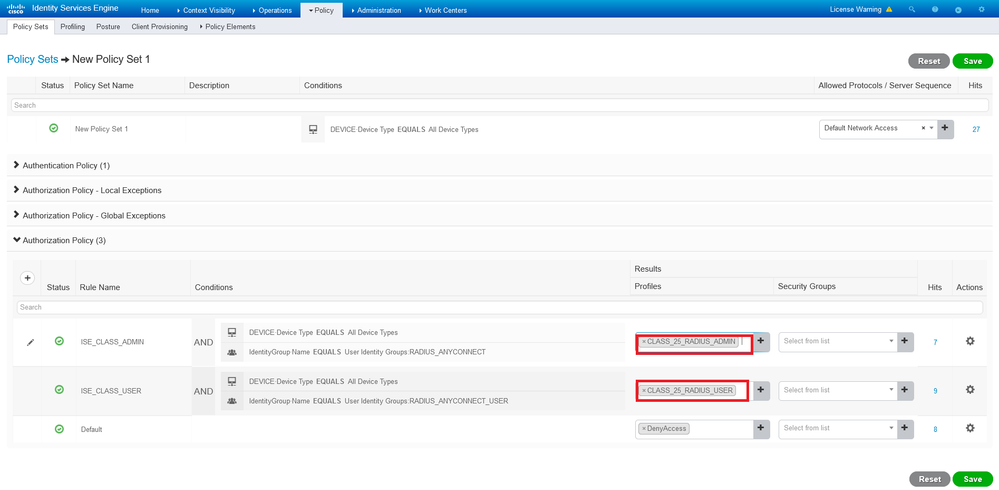
With this configuration example, you can assign the group policy dynamically to each Secure Client user through ISE configuration based on the identity group the user belongs to.
Verify
One of the most useful debugs is debug radius. It shows details of the radius authentication request and authentication response between the AAA server (ISE) and the ASA.
debug radius
Another useful tool is the command test aaa-server. You now see if the authentication is ACCEPTED or REFUSED and the attributes ('class' attribute in this example) that were exchanged in the authentication process.
test aaa-server authentication <aaa_server_group> [host <name>|<host_ip>] username <user> password <password>Working Scenario
In the configuration example mentioned before, user1 belongs to the RADIUS-ADMIN group policy per the ISE configuration. It can be verified if you run the test aaa-server and enable radius debugs on the ASA. The relevant lines from the debugs are marked in bold.
ASAv# debug radius
ASAv#test aaa-server authentication ISE_AAA host 10.31.124.82 username user1 password *****
INFO: Attempting Authentication test to IP address (10.31.124.82) (timeout: 12 seconds)
RADIUS packet decode (authentication request) -------------------------------------- Raw packet data (length = 84)..... 01 1e 00 54 ac b6 7c e5 58 22 35 5e 8e 7c 48 73 | ...T..|.X"5^.|Hs 04 9f 8c 74 01 07 75 73 65 72 31 02 12 ad 19 1c | ...t..user1..... 40 da 43 e2 ba 95 46 a7 35 85 52 bb 6f 04 06 0a | @.C...F.5.R.o... 1f 7c 55 05 06 00 00 00 06 3d 06 00 00 00 05 1a | .|U......=...... 15 00 00 00 09 01 0f 63 6f 61 2d 70 75 73 68 3d | .......coa-push= 74 72 75 65 | true Parsed packet data..... Radius: Code = 1 (0x01) Radius: Identifier = 30 (0x1E) Radius: Length = 84 (0x0054) Radius: Vector: ACB67CE55822355E8E7C4873049F8C74 Radius: Type = 1 (0x01) User-Name Radius: Length = 7 (0x07) Radius: Value (String) = 75 73 65 72 31 | user1 Radius: Type = 2 (0x02) User-Password Radius: Length = 18 (0x12) Radius: Value (String) = ad 19 1c 40 da 43 e2 ba 95 46 a7 35 85 52 bb 6f | ...@.C...F.5.R.o Radius: Type = 4 (0x04) NAS-IP-Address Radius: Length = 6 (0x06) Radius: Value (IP Address) = 10.31.124.85 (0x0A1F7C55) Radius: Type = 5 (0x05) NAS-Port Radius: Length = 6 (0x06) Radius: Value (Hex) = 0x6 Radius: Type = 61 (0x3D) NAS-Port-Type Radius: Length = 6 (0x06) Radius: Value (Hex) = 0x5 Radius: Type = 26 (0x1A) Vendor-Specific Radius: Length = 21 (0x15) Radius: Vendor ID = 9 (0x00000009) Radius: Type = 1 (0x01) Cisco-AV-pair Radius: Length = 15 (0x0F) Radius: Value (String) = 63 6f 61 2d 70 75 73 68 3d 74 72 75 65 | coa-push=true send pkt 10.31.124.82/1645 rip 0x00007f03b419fb08 state 7 id 30 rad_vrfy() : response message verified rip 0x00007f03b419fb08 : chall_state '' : state 0x7 : reqauth: ac b6 7c e5 58 22 35 5e 8e 7c 48 73 04 9f 8c 74 : info 0x00007f03b419fc48 session_id 0x80000007 request_id 0x1e user 'user1' response '***' app 0 reason 0 skey 'cisco123' sip 10.31.124.82 type 1 RADIUS packet decode (response) -------------------------------------- Raw packet data (length = 188)..... 02 1e 00 bc 9e 5f 7c db ad 63 87 d8 c1 bb 03 41 | ....._|..c.....A 37 3d 7a 35 01 07 75 73 65 72 31 18 43 52 65 61 | 7=z5..user1.CRea 75 74 68 53 65 73 73 69 6f 6e 3a 30 61 31 66 37 | uthSession:0a1f7 63 35 32 52 71 51 47 52 72 70 36 5a 35 66 4e 4a | c52RqQGRrp6Z5fNJ 65 4a 39 76 4c 54 6a 73 58 75 65 59 35 4a 70 75 | eJ9vLTjsXueY5Jpu 70 44 45 61 35 36 34 66 52 4f 44 57 78 34 19 0e | pDEa564fRODWx4.. 52 41 44 49 55 53 2d 41 44 4d 49 4e 19 50 43 41 | RADIUS-ADMIN.PCA 43 53 3a 30 61 31 66 37 63 35 32 52 71 51 47 52 | CS:0a1f7c52RqQGR 72 70 36 5a 35 66 4e 4a 65 4a 39 76 4c 54 6a 73 | rp6Z5fNJeJ9vLTjs 58 75 65 59 35 4a 70 75 70 44 45 61 35 36 34 66 | XueY5JpupDEa564f 52 4f 44 57 78 34 3a 69 73 65 61 6d 79 32 34 2f | RODWx4:iseamy24/ 33 37 39 35 35 36 37 34 35 2f 33 31 | 379556745/31 Parsed packet data..... Radius: Code = 2 (0x02) Radius: Identifier = 30 (0x1E) Radius: Length = 188 (0x00BC) Radius: Vector: 9E5F7CDBAD6387D8C1BB0341373D7A35 Radius: Type = 1 (0x01) User-Name Radius: Length = 7 (0x07) Radius: Value (String) = 75 73 65 72 31 | user1 Radius: Type = 24 (0x18) State Radius: Length = 67 (0x43) Radius: Value (String) = 52 65 61 75 74 68 53 65 73 73 69 6f 6e 3a 30 61 | ReauthSession:0a 31 66 37 63 35 32 52 71 51 47 52 72 70 36 5a 35 | 1f7c52RqQGRrp6Z5 66 4e 4a 65 4a 39 76 4c 54 6a 73 58 75 65 59 35 | fNJeJ9vLTjsXueY5 4a 70 75 70 44 45 61 35 36 34 66 52 4f 44 57 78 | JpupDEa564fRODWx 34 | 4 Radius: Type = 25 (0x19) Class Radius: Length = 14 (0x0E) Radius: Value (String) = 52 41 44 49 55 53 2d 41 44 4d 49 4e | RADIUS-ADMIN
Radius: Type = 25 (0x19) Class Radius: Length = 80 (0x50) Radius: Value (String) = 43 41 43 53 3a 30 61 31 66 37 63 35 32 52 71 51 | CACS:0a1f7c52RqQ 47 52 72 70 36 5a 35 66 4e 4a 65 4a 39 76 4c 54 | GRrp6Z5fNJeJ9vLT 6a 73 58 75 65 59 35 4a 70 75 70 44 45 61 35 36 | jsXueY5JpupDEa56 34 66 52 4f 44 57 78 34 3a 69 73 65 61 6d 79 32 | 4fRODWx4:iseamy2 34 2f 33 37 39 35 35 36 37 34 35 2f 33 31 | 4/379556745/31 rad_procpkt: ACCEPT RADIUS_ACCESS_ACCEPT: normal termination RADIUS_DELETE remove_req 0x00007f03b419fb08 session 0x80000007 id 30 free_rip 0x00007f03b419fb08 radius: send queue empty INFO: Authentication Successful
Another way to verify if user1 was assigned the correct group policy by ISE when connected via Secure Client is with the show vpn-sessiondb anyconnect command.
ASAv# show vpn-sessiondb anyconnect Session Type: AnyConnect Username : user1 Index : 28 Assigned IP : 10.100.2.1 Public IP : 10.100.1.3 Protocol : AnyConnect-Parent SSL-Tunnel DTLS-Tunnel License : AnyConnect Premium Encryption : AnyConnect-Parent: (1)none SSL-Tunnel: (1)AES-GCM-256 DTLS-Tunnel: (1)AES256 Hashing : AnyConnect-Parent: (1)none SSL-Tunnel: (1)SHA384 DTLS-Tunnel: (1)SHA1 Bytes Tx : 15604 Bytes Rx : 28706 Group Policy : RADIUS-ADMIN Tunnel Group : DefaultWEBVPNGroup Login Time : 04:14:45 UTC Wed Jun 3 2020 Duration : 0h:01m:29s Inactivity : 0h:00m:00s VLAN Mapping : N/A VLAN : none Audt Sess ID : 0a6401010001c0005ed723b5 Security Grp : none
Troubleshoot
You can also use the debug radius and test aaa-server commands to troubleshoot when issues occur. The most common issues are described next.
Non-working Scenario 1
If the Authentication fails on Anyconnect and the ISE replies with a REJECT. You need to verify either the user is associated with a User Identity Group or the password is incorrect. Navigate to Operations>Live logs > Details.
RADIUS packet decode (response) -------------------------------------- Raw packet data (length = 20)..... 03 21 00 14 dd 74 bb 43 8f 0a 40 fe d8 92 de 7a | .!...t.C..@....z 27 66 15 be | 'f.. Parsed packet data..... Radius: Code = 3 (0x03) Radius: Identifier = 33 (0x21) Radius: Length = 20 (0x0014) Radius: Vector: DD74BB438F0A40FED892DE7A276615BE rad_procpkt: REJECT RADIUS_DELETE remove_req 0x00007f03b419fb08 session 0x80000009 id 33 free_rip 0x00007f03b419fb08 radius: send queue empty ERROR: Authentication Rejected: AAA failure
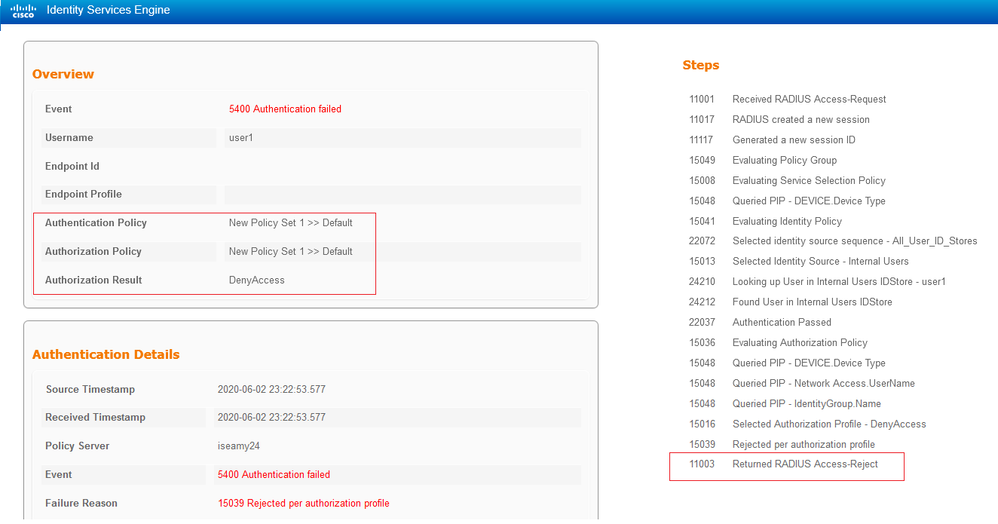
Note: In this example, user1 is not associated with any User Identity Group. Therefore, it hits the Default Authentication and Authorization policies under the New Policy Set 1 with the DenyAccess action. You can modify this action to PermitAcces in the Default Authorization Policy to allow the users without the User identity group associated to authenticate.
Non-working Scenario 2
If the Authentication fails on Anyconnect and the default Authorization policy is PermitAccess, the authentication is accepted. However, the class attribute is not presented in the Radius response, therefore the user is located in the DfltGrpPolicy and it does not connect due to the configured command: vpn-simultaneous-logins 0.
RADIUS packet decode (response) -------------------------------------- Raw packet data (length = 174)..... 02 24 00 ae 5f 0f bc b1 65 53 64 71 1a a3 bd 88 | .$.._...eSdq.... 7c fe 44 eb 01 07 75 73 65 72 31 18 43 52 65 61 | |.D...user1.CRea 75 74 68 53 65 73 73 69 6f 6e 3a 30 61 31 66 37 | uthSession:0a1f7 63 35 32 32 39 54 68 33 47 68 6d 44 54 49 35 71 | c5229Th3GhmDTI5q 37 48 46 45 30 7a 6f 74 65 34 6a 37 50 76 69 4b | 7HFE0zote4j7PviK 5a 35 77 71 6b 78 6c 50 39 33 42 6c 4a 6f 19 50 | Z5wqkxlP93BlJo.P 43 41 43 53 3a 30 61 31 66 37 63 35 32 32 39 54 | CACS:0a1f7c5229T 68 33 47 68 6d 44 54 49 35 71 37 48 46 45 30 7a | h3GhmDTI5q7HFE0z 6f 74 65 34 6a 37 50 76 69 4b 5a 35 77 71 6b 78 | ote4j7PviKZ5wqkx 6c 50 39 33 42 6c 4a 6f 3a 69 73 65 61 6d 79 32 | lP93BlJo:iseamy2 34 2f 33 37 39 35 35 36 37 34 35 2f 33 37 | 4/379556745/37 Parsed packet data..... Radius: Code = 2 (0x02) Radius: Identifier = 36 (0x24) Radius: Length = 174 (0x00AE) Radius: Vector: 5F0FBCB1655364711AA3BD887CFE44EB Radius: Type = 1 (0x01) User-Name Radius: Length = 7 (0x07) Radius: Value (String) = 75 73 65 72 31 | user1 Radius: Type = 24 (0x18) State Radius: Length = 67 (0x43) Radius: Value (String) = 52 65 61 75 74 68 53 65 73 73 69 6f 6e 3a 30 61 | ReauthSession:0a 31 66 37 63 35 32 32 39 54 68 33 47 68 6d 44 54 | 1f7c5229Th3GhmDT 49 35 71 37 48 46 45 30 7a 6f 74 65 34 6a 37 50 | I5q7HFE0zote4j7P 76 69 4b 5a 35 77 71 6b 78 6c 50 39 33 42 6c 4a | viKZ5wqkxlP93BlJ 6f | o Radius: Type = 25 (0x19) Class Radius: Length = 80 (0x50) Radius: Value (String) = 43 41 43 53 3a 30 61 31 66 37 63 35 32 32 39 54 | CACS:0a1f7c5229T 68 33 47 68 6d 44 54 49 35 71 37 48 46 45 30 7a | h3GhmDTI5q7HFE0z 6f 74 65 34 6a 37 50 76 69 4b 5a 35 77 71 6b 78 | ote4j7PviKZ5wqkx 6c 50 39 33 42 6c 4a 6f 3a 69 73 65 61 6d 79 32 | lP93BlJo:iseamy2 34 2f 33 37 39 35 35 36 37 34 35 2f 33 37 | 4/379556745/37 rad_procpkt: ACCEPT RADIUS_ACCESS_ACCEPT: normal termination RADIUS_DELETE remove_req 0x00007f03b419fb08 session 0x8000000b id 36 free_rip 0x00007f03b419fb08 radius: send queue empty INFO: Authentication Successful ASAv#
If the vpn-simultaneous-logins 0 is changed to '1', The user connects as shown in the output:
ASAv# show vpn-sessiondb anyconnect Session Type: AnyConnect Username : user1 Index : 41 Assigned IP : 10.100.2.1 Public IP : 10.100.1.3 Protocol : AnyConnect-Parent SSL-Tunnel DTLS-Tunnel License : AnyConnect Premium Encryption : AnyConnect-Parent: (1)none SSL-Tunnel: (1)AES-GCM-256 DTLS-Tunnel: (1)AES256 Hashing : AnyConnect-Parent: (1)none SSL-Tunnel: (1)SHA384 DTLS-Tunnel: (1)SHA1 Bytes Tx : 15448 Bytes Rx : 15528 Group Policy : DfltGrpPolicy Tunnel Group : DefaultWEBVPNGroup Login Time : 18:43:39 UTC Wed Jun 3 2020 Duration : 0h:01m:40s Inactivity : 0h:00m:00s VLAN Mapping : N/A VLAN : none Audt Sess ID : 0a640101000290005ed7ef5b Security Grp : none
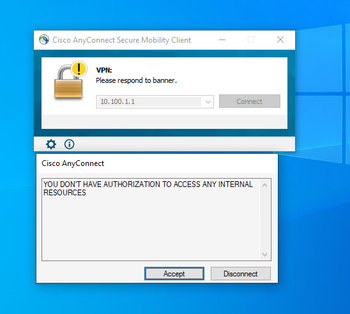
Non-working Scenario 3
If the Authentication passes but the user does not have the right policies applied, for example, if the group-policy connected has the split tunnel instead of the full tunnel as it must be. The user can be in the wrong User identity group.
ASAv# sh vpn-sessiondb anyconnect Session Type: AnyConnect Username : user1 Index : 29 Assigned IP : 10.100.2.1 Public IP : 10.100.1.3 Protocol : AnyConnect-Parent SSL-Tunnel License : AnyConnect Premium Encryption : AnyConnect-Parent: (1)none SSL-Tunnel: (1)AES-GCM-256 Hashing : AnyConnect-Parent: (1)none SSL-Tunnel: (1)SHA384 Bytes Tx : 15592 Bytes Rx : 0 Group Policy : RADIUS-USERS Tunnel Group : DefaultWEBVPNGroup Login Time : 04:36:50 UTC Wed Jun 3 2020 Duration : 0h:00m:20s Inactivity : 0h:00m:00s VLAN Mapping : N/A VLAN : none Audt Sess ID : 0a6401010001d0005ed728e2 Security Grp : none
Video
This video provides the steps to configure SSL Anyconnect With ISE Authentication And Class Attribute For Group-Policy Mapping.
Revision History
| Revision | Publish Date | Comments |
|---|---|---|
2.0 |
08-Aug-2024 |
Recertification, updated content. |
1.0 |
15-Jun-2020 |
Initial Release |
Contributed by Cisco Engineers
- Amanda Nava ZarateCustomer Delivery Engineering Technical Leader
- Reviewed by Angel OrtizSecurity Technical Leader
Contact Cisco
- Open a Support Case

- (Requires a Cisco Service Contract)
 Feedback
Feedback